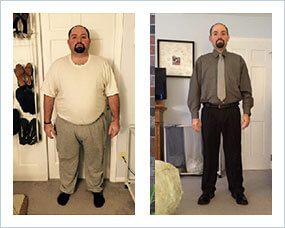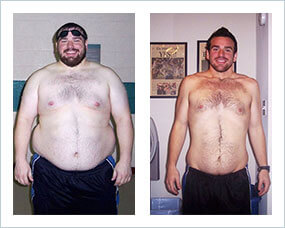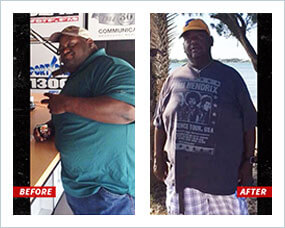The gastric sleeve before and after pictures below combined with the subsequent calculators & information set the stage for what you can expect after surgery, including:
- You will lose up to 70% of your excess weight in the first year
- You will improve or cure all of your obesity-related health problems
- Your self confidence will go way up, as will your overall quality of life
- You will improve cognition (become smarter)
Read the sections below for everything you need to know about life before and after gastric sleeve surgery.
Before and after weight loss success
Individual results may vary
TABLE OF CONTENTS
Click on any of the topics below to jump directly to that section
- Calculate Your Weight Loss
- Pictures - Women
- Pictures - Men
- Pictures - Celebrities
- Videos
- Skin After Surgery
- Health Conditions
- Lifestyle Changes
- Your New Diet
- Your Brain
- Relationships
- Gastric Sleeve Surgery Vs. Other Procedures
- Exercise
- Patient Community & Expert Advice
- Find a Weight Loss Surgeon

SECTION SUMMARY:
- Up to 70% of excess weight lost in the first year
Weight loss happens fast after gastric sleeve surgery:
- Month 3: About 1/3 of excess weight is gone
- Month 6: About half of excess weight is gone
- Month 12: Up to 70% of excess weight is gone
Most patients reach a plateau around the one to two year mark. Patients who eat and exercise right are usually able to keep the weight off or lose even more.
But many patients let their dedication slip and regain some weight. This is due to the stomach stretching over time, which is usually caused by overeating.
By 5 years after surgery, the average patient has kept off over half of their excess weight. Successful patients avoid weight regain by:
- Working closely with their surgeon’s dietitian or nutritionist
- Using a personal trainer
- Attending in-person or online support groups at least twice per month
- Keeping a food journal
- Having the support of family and friends
- Maintaining motivation and dedication
For more information about gastric sleeve weight loss, see the following pages:
SECTION SUMMARY:
- Review the 7 Sets of Pictures Below
See below for weight loss photos of women before and after gastric sleeve surgery:

Image source: www.gastricsleevemexicos.com
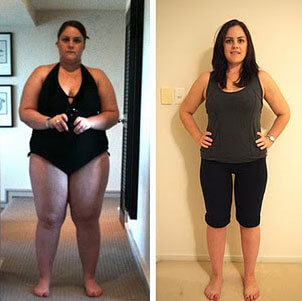
Image source: i.pinimg.com

Image source: www.healthdummy.org

Image source: www.cosmetic-tour.com

Image source: s-media-cache-ak0.pinimg.com

Image source: www.thinnertimesforum.com

Image source: i.ytimg.com

SECTION SUMMARY:
- Review the 7 Sets of Pictures Below
See below for weight loss photos of men before and after gastric sleeve surgery:
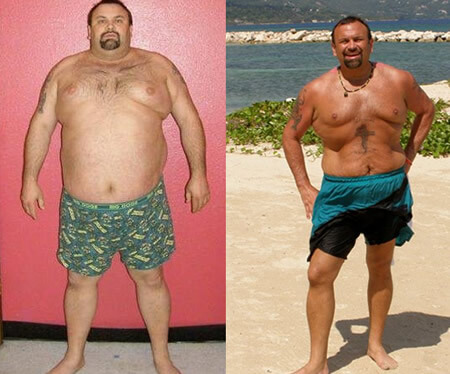
Image source: www.gastricsleevemexicos.com
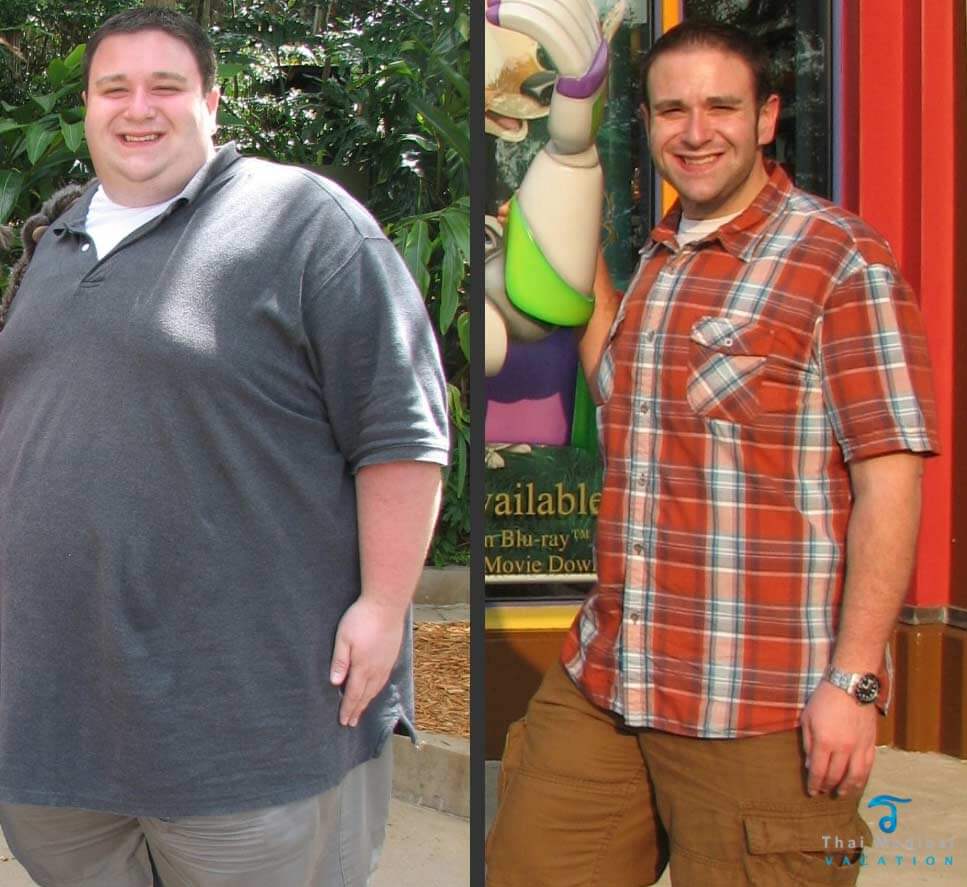
Image source: cdn.thaimedicalvacation.com
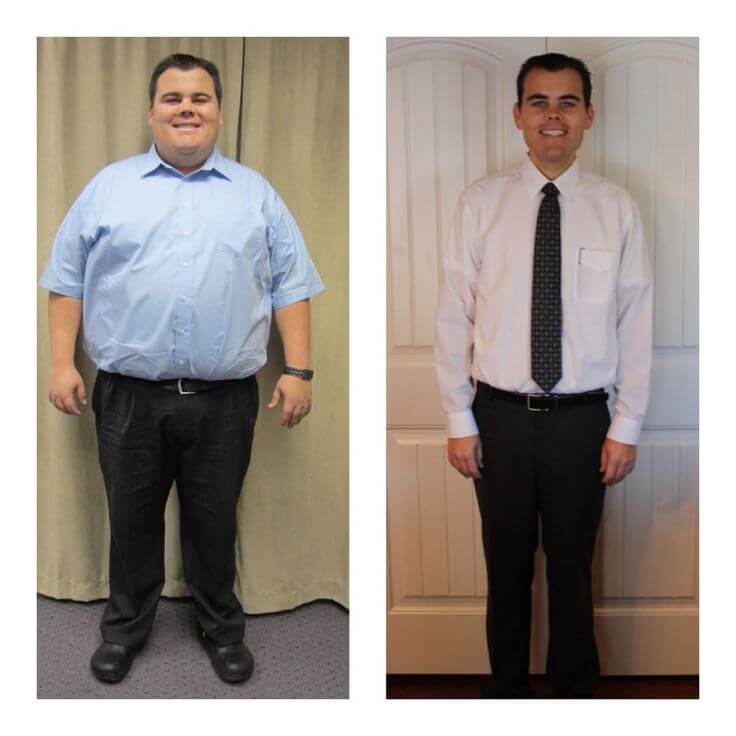
Image source: i.pinimg.com

Image source: www.mooremetabolics.com
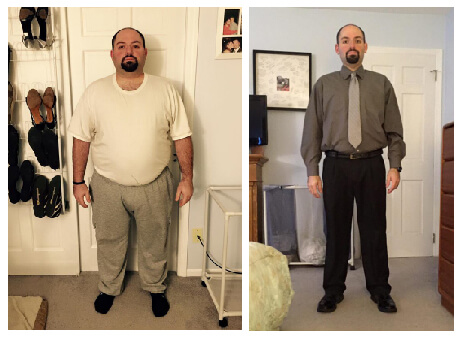
Image source: primesurgicare.com

Image source: oliakcenter-wpengine.netdna-ssl.com
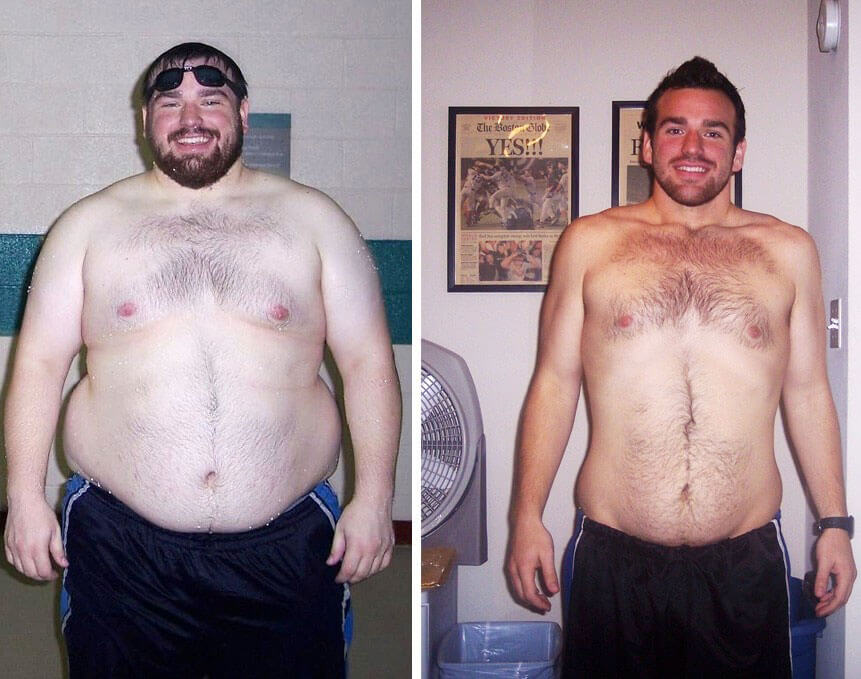
Image source: www.khaleejmag.com
SECTION SUMMARY:
- Review the Updated list of “confirmed” gastric sleeve celebrities below
Many celebrities, including former professional athletes, have undergone weight loss surgery. The following celebrity before and after pictures show results from surgery patients you may recognize:
Mariah Carey – Singer Songwriter

Image source: upload.wikimedia.org
Carrie Fisher – Movie Star

Image source: loanpride.com
Rosie O’Donnell – TV Personality

Image source: s-media-cache-ak0.pinimg.com
“Mama June” – Reality TV Personality

Image source: www.womenshealthmag.com
Lisa Lampanelli – Comedian

Image source: i.pinimg.com
Paul Wall – Rapper/Musician

Image source: dbou9h1pp5ks6.cloudfront.net
Graham Elliot – Reality TV Judge on “MasterChef”

Image source: i.dailymail.co.uk
E.J. Johnson – Magic Johnson’s Son

Image source: s.yimg.com
Elvis Duran – American Radio Personality

Image source: images-production.global.ssl.fastly.net
Lavell Crawford – Actor
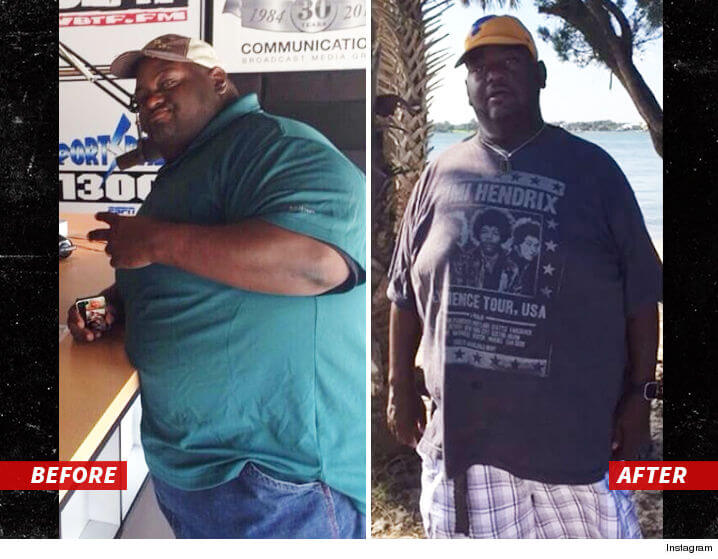
Image source: media.tmz.com
SECTION SUMMARY:
- Hear from gastric sleeve patients about their weight loss journey
See below for videos of patients discussing their experience of gastric sleeve after surgery:
SECTION SUMMARY:
- Minimal scarring as a result of surgery
- Excess skin can be removed with plastic surgery
Scarring
What your gastric sleeve scars will look like depends on how your procedure is performed:
- Single-incision laparoscopic surgery – One small scar hidden in your belly button – Becoming more common
- Multi-port laparoscopic surgery – 4 to 5 small scars across the abdomen – Still very common
- Open surgery – Large scar across the abdomen – Usually only done for emergencies during surgery
See our Gastric Sleeve Scars page for pictures and more information.
Sagging Skin & Plastic Surgery
For most gastric sleeve patients, the skin has been stretched out for so long to accommodate their extra weight that it has lost its elasticity. Gastric sleeve surgery causes most patients to lose a lot of weight very quickly, and your skin simply can’t keep up.The extra skin may be embarrassing. It can also cause several issues ranging from minor to severe, including:
- Difficulty getting dressed
- Difficulty exercising, which may impact long-term weight maintenance and health
- Skin fold rashes or breakdown of skin
- Skin fold infections
In some cases, patients manage sagging skin with body-contouring undergarments. In more serious cases, patients have plastic surgery to remove the excess skin. Surgery to remove excess skin is often covered by insurance.
See our Plastic Surgery After Weight Loss page for more information.
SECTION SUMMARY:
- Many health related issues can be improved or “cured” following surgery
Navigate the following to graphic to see how gastric sleeve can improve your health, or scroll down to learn about gastric sleeve results for the average patient.
Gastric sleeve results in complete “resolution” (cure, as long as weight loss is maintained) of many obesity-related health problems. Patients who aren’t cured usually experience a noticeable improvement.
Following is a list of conditions known to be cured or improved by gastric sleeve surgery, ordered by percent of patients helped.
Click Here to See A Full List of Health BenefitsHealth improvement results of gastric sleeve surgery also include:
- Quality of life improvements: 93% of patients (1)
- Mortality Reduction/Life Expectancy (5-year mortality): 89% lower risk of death (2)
- Cardiovascular disease: significant improvement (3) (4)
- Depression: Improvement documented but no aggregate data available (5) (6)
- Non-Alcoholic Fatty Liver Disease: Improvement documented but no sleeve-specific percentages available (7)
- Pseudotumor cerebri: Improvement documented but no sleeve-specific percentages available (8)
Gastric sleeve weight loss improves joint health. For every pound of weight lost, there is a 4 pound reduction in pressure on the knee (9). This improves mobility and reduces pain in the knees.
88,000 participants were involved in data collection on cancer research. Results state that patients who undergo weight loss surgery have 33% less risk of developing cancer (10).
Risk rates were even further reduced for obesity-related cancers, including (11):
- Colon cancer
- Postmenopausal breast cancer
- Endometrial cancer
- Pancreatic cancer
See our Gastric Sleeve Testimonials page for patient feedback on improved health after gastric sleeve surgery.
SECTION SUMMARY:
- If you choose to undergo gastric sleeve surgery, you'll have to commit to a healthier lifestyle. Please read the details below.
Lifestyle changes before and after gastric sleeve surgery are crucial to your success in losing weight and keeping it off. Start living as if you’ve had the surgery at least 3 months in advance. The following advice will help guide you through the changes you may undergo before and after gastric sleeve surgery:
- Begin eating for health and not just flavor and pleasure – Your smaller stomach after surgery will prevent your body from processing as much food as you’re used to. This is great for weight loss but bad for getting the nutrition your body needs to function properly. If you fill up with junk food and don’t get the nutrients you need following surgery, you’ll risk suffering from one of the many horrible effects of malnutrition. See our Top 5 Long-Term Bariatric Diet Success Factors for more information.
- Eat protein, protein and more protein – Protein is essential for weight loss as it helps you to feel full sooner and for a longer period of time. It will also help you preserve muscle during your rapid weight loss following surgery.
- Eat slow, chew each bite and watch the portion sizes – The feeling of satiety(fullness) takes 20 to 30 minutes to reach your brain. Eating slowly and chewing thoroughly helps you to stay in touch with with your body so you don’t overeat and stretch your new stomach/pouch. Practicing this while preparing for weight loss surgery will help you lose weight.
- Start taking a multivitamin – Since bariatric patients don’t absorb nutrients as well due to changes in the digestive system and from consuming less food, you’ll need to take supplements after surgery. Start building that into your routine now… talk with your doctor about which multivitamins they recommend.
- Don’t drink anything with your meals – Following surgery, you’ll need to wait at least an hour after meals before you drink anything. Liquids can flush food through your smaller post-op stomach causing you to feel hungry sooner and leading to weight regain.
- In addition, after surgery you will not have as much space in your stomach for food and fluids (your stomach will be smaller) and you can end up dehydrated or malnourished if you don’t eat and drink separately. This step is very important, especially early after recovery when you are still healing.
- Ditch the sugary beverages and drink more water – Provided you don’t have any fluid restrictions, start drinking 64 oz of water or more per day. Drinking plenty of water over the months spent preparing for weight loss surgery helps patients in a few important ways such as giving you an early feeling of fullness (thus promoting pre-op weight loss), keeping you well-hydrated and flushing out your kidneys in order to reduce the chances of kidney stones that can develop with rapid weight loss following surgery.
- Careful with the coffee – Coffee in small amounts is fine but eliminate the unhealthy calories that come from sugar and cream. To ease the transition, high-caffeine tea with a small amount of honey may be a good alternative.
- Stop drinking alcohol – Due to the changes to your digestive system after surgery, alcohol will have a much different effect on your body. It will be much easier for you to become intoxicated meaning you’ll be more likely to give into food cravings. Alcohol after surgery can also cause your blood sugar to go haywire resulting in weight regain and will put you at a higher risk of several health problems, some of which are severe.
- Exercise just a little bit more – Start slow, do something you enjoy, just start moving. Ideally you can tolerate moving for up to 20 to 30 minutes each day. This will reduce the risk of complications during surgery, assist with weight loss before surgery and get you into a habit that will lead to long-term weight loss.
- Stop smoking – Smoking increases the risk of blood clots during surgery up to 6 weeks following your last cigarette. Additionally, studies suggest that tobacco smokers failed to complete preoperative weight loss programs at twice the rate of non-smokers (3). If you currently use tobacco, consider entering a tobacco cessation program or starting a nicotine replacement regimen that may include patches or gum.
- Start attending in-person support group meetings – The importance of hearing other patients’ real-world experiences can not be understated. Other patients will give you first-hand insights that your surgical team may not be able to provide directly and will let you build relationships that will continue to help you succeed following surgery. Your surgeon can provide details about how to find a local bariatric surgery support group.
We know these changes won’t be easy, which is why you’re starting early. Be patient with yourself… practice self management and forgiveness. As you slowly start changing your routine throughout the weeks and months spent preparing for weight loss surgery, the adjustments will become easier and easier.
See our Preparing for Weight Loss surgery page for more information.
SECTION SUMMARY:
- You'll be on a restricted diet before and after surgery
- You'll have to take vitamins & supplements for the rest of your life (see details below)
Your diet before and after gastric sleeve surgery will be a major factor in how much weight you lose. Strictly following recommended diets and avoiding unhealthy foods is the best way to ensure to long-term weight loss after surgery. Prepare for surgery and be ready to commit to long-term dietary changes:
- Pre-op diet starts 3+ weeks before surgery
- Post-op diet lasts from 3 days to 4 weeks (each surgeon has different guidelines) with a gradual transition from clear liquids to solid foods
- Primarily healthy meals with limited snacking
- 60+ grams of protein per day
- 2+ liters of low-calorie fluids per day
- Strict vitamin regimen
See the following pages for dietary guidelines before and after surgery:
SECTION SUMMARY:
- Your brain may function better after surgery
- You will be less hungry after surgery, but it won't fix food addiction

In addition to the many physical benefits following gastric sleeve, one important organ often goes overlooked: the brain. This organ consumes 20% of our energy and impacts our cognition, executive function, and moods. Gastric sleeve surgery will affect how it works.
1. Cognition
Multiple studies suggest that obesity is linked to cognitive decline. Links to dementia, and an earlier onset of symptoms have been established (12). Other studies suggest that short term memory and attention deficits impair the population (13).
While there are varying theories as to why obesity contributes to cognitive issues, a popular school of thought suggests it is related to blood flow within the brain. Obesity is considered a risk factor for cerebrovascular disease (14), a condition where blood does not properly move throughout the brain. Dysregulated blood flow may cause a variety of issues including stroke and vascular dementia.
Fortunately, studies also indicate that gastric sleeve surgery may improve cognition and brain health. In one study of patients, scores measuring cognitive function demonstrated improvement up to three years following surgery (15). Measured variables in the study included executive functioning, short term memory and attention span.
2. Hormone Regulation
Gastric sleeve surgery can go a long way toward improving the delicate balance between brain function and hormones. Hormones play a vital role in regulating hunger, mood, and a variety of other health factors.
When your stomach is empty, it secretes a hormone called ghrelin into your bloodstream. This causes your brain to generate hunger impulses.
After you eat, the amount of secreted ghrelin drops then slowly rises until your next meal. Since your stomach will be so much smaller after gastric sleeve surgery, the amount of ghrelin it secretes may also go down.
Less ghrelin in your system means you will feel less hungry than you did before surgery. See our page about Obesity & Genetics for more information.
Obesity also contributes to excess hormones that includes estrogen. Following gastric sleeve surgery and weight loss, estrogen levels may decrease. A more balanced testosterone to estrogen ratio may lead to improved energy, mood and sex drive for males and females alike.
3. Food Addiction
You may have food addiction if your desire for food takes priority over other important parts of your life, such as:
- Personal health
- Family
- Friends
- Work
- Your appearance
- Avoiding obesity related health issues like hypertension, sleep apnea, or diabetes
If left unchecked, food addiction can lead to obesity. If not addressed before surgery, it can also lead to weight regain.
To find out if you may be suffering from food addiction, take our Food Addiction Quiz.
SECTION SUMMARY:
- Your relationships may change
- The quality of sex life can improve
Relationships after gastric sleeve surgery may improve or get worse, depending on the relationship.
Gastric sleeve surgery leads to rapid and significant weight loss, and people will start treating you differently within a couple of months after surgery. Following are positive experiences reported by most patients:
- Treated with more respect
- More romantic interest from others
- No more obesity discrimination
- Deeper relationships as a result of being able to physically keep up with kids and more physically fit friends
- More compliments from others
- Increased self-confidence
- Improvements in quality of sexual life (16)
However, being “newly thin” may carry unforeseen negatives as well:
- How will overweight friends or family members feel when you’re losing weight but they are not?
- If they’re not making diet and lifestyle changes as well, will your friends or family make it more difficult for you to stay on track?
- How will your coworkers react? Should you even tell them you are having surgery?
- Will your new healthier diet and smaller portion sizes make meals with others awkward?
- Could intimacy with your spouse or partner be effected?
- Could your spouse or partner become jealous now that others are noticing you more?
The way you view people and relationships may change as well. Common thoughts include:
- “Would this person be treating me the same way if I hadn’t lost all of this weight?”
- “How do I handle obesity discrimination now that I’m on the “other side”?”
For real life experiences and advice from other gastric bypass patients, see our Relationships After Weight Loss surgery page.
SECTION SUMMARY:
- The gastric sleeve has best 1-year weight loss & 3rd best 5-year weight loss
- Comparable or better health benefits when stacked up against the other weight loss procedures
Gastric sleeve is currently the most popular weight loss surgery option, accounting for over 50 percent of all weight loss surgeries. If you’re comparing gastric sleeve vs other weight loss procedures, consider the following information:
1. Weight Loss Comparisons
Click Here to See Weight Loss Comparisons2. Compare Health Benefits
In general, health improvement for obesity-related health problems is directly proportionate to the amount of weight loss over time. See the weight loss comparison above to see which procedures result in the most short- and long-term weight loss and therefore the best health improvement.
However, procedures that remove part of the stomach (only gastric sleeve, gastric bypass, and duodenal switch) are more likely to improve or cure Type 2 diabetes than procedures that leave the stomach intact.
SECTION SUMMARY:
- You should walking daily before surgery
- You must establish a consistent workout routine after surgery
It is important to exercise before and after gastric sleeve surgery. Exercise is almost as important as your diet when it comes to long-term success following gastric sleeve surgery:
- Patients who exercise regularly lose more weight over the long-term
- Physical and mental health benefits are incredible
To help you stay on track, block out time to exercise at the same times on the same days of the week.
Also, spread your 2.5 hours per week out over 3 or 4 days (in other words, 30 to 45 minutes 3 or 4 days per week). This will make it less intimidating to get started each day and will help you build endurance.
Exercise Types
There should be 3 main goals of your exercise routine:
- Endurance – walking, stationary bike, and especially swimming
- Flexibility – a good stretching routine. Yoga is best since it incorporates proper breathing and uses your own bodyweight to build strength
- Strength – exercise balls, weights, and yoga
Recognize that your ultimate goal is NOT to exercise like a young, lean person. Not only will this make your goals feel more achievable, but it’s simply not necessary.
This stance was confirmed by researchers studying the exercise habits of 100 people: 50 of normal weight who exercised regularly vs. 50 post-gastric bypass patients who achieved 80% or greater excess weight loss. They found that compared to the normal-weight group, the weight loss surgery group maintained a similar body mass index with less rigorous but equally consistent exercise (17).
In short, you need to stick to a routine, but you don’t need to win Cross-Fit Trainee of the Year to achieve and maintain a normal BMI.
SECTION SUMMARY:
- You can read about the experiences of other patients after their gastric sleeve surgery
- You can "Ask the Expert"
If you still have questions about gastric sleeve surgery, our experts are happy to answer them. We (and other patients) would also love to hear about your experiences.
Please use the form below to share your experience or ask a question.
Questions From Other Visitors*
Click below to see contributions from other visitors to this page.
Hi Doctor, I’m very ambitious to lose weight by bariatric surgery after using an online gastric sleeve calculator to see how much I’d lose. The gastric sleeve weight loss calculator…
Same Day Release From Hospital After Gastric Sleeve*To whom it may concern, I have a few questions about same day gastric sleeve surgery. I’m getting the gastric sleeve this summer and my surgeon offers outpatient bariatric surgery.…
SECTION SUMMARY:
- You can ask a local bariatric practice for a free insurance check or cost quote
- You can attend a free in-person seminar or an online webinar offered by a local weight loss surgeon
- You should schedule a phone or in-person consultation (both often free), if you are interested in learning more about weight loss surgery













